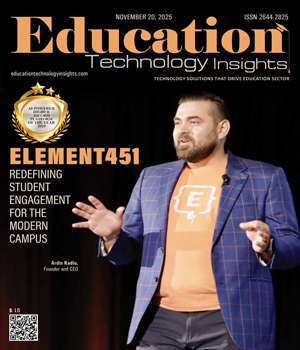THANK YOU FOR SUBSCRIBING
Be first to read the latest tech news, Industry Leader's Insights, and CIO interviews of medium and large enterprises exclusively from Education Technology Insights
Accelerating Startup Growth From Within the University Walls
Monique Sendze,Deputy/Interim CIO,Colorado School of Mines
 Monique Sendze,Deputy/Interim CIO,Colorado School of Mines
Monique Sendze,Deputy/Interim CIO,Colorado School of MinesAs technology continues to permeate the Higher Education market, so too has the number of EdTech startups that are vying to provide solutions to the myriad of problems higher education institutions are facing today like student success, decrease in enrollment, a decline in funding, retention, and digital transformation - to name a few. To match this trend, funding for EdTech startups willing to solve these problems using novel approaches like Artificial Intelligence (AI), Internet of Things (IoT), Machine Learning (ML), Virtual Reality (VR), Augmented Reality (AR), Advanced Analytics, and other technologies have also ballooned in recent years as more CIOs, and University Administrators are increasingly more open to look and engage outside of their legacy established HigherEd partners for help identifying potential solutions that meet the needs of their institutions. But getting into the education industry comes with many challengesnot encountered in other sectors in which startups have made significant strides for years. HigherEd is a heavily regulated industry that is also bogged down by cumbersome procurement processes, compliance, and security mandates, and mostly has a low tolerance for risks. However, these challenges haven’t stopped tech startups from breaking in and partnering with education experts to disrupt the field.
The number of EdTech startup companies that participate at the EDUCAUSE annual start-up alley events that feature participating companies that are under five years old have less than $1M in revenue and employ under 25 employees captures the proliferation of this trend. These companies have the opportunity to pitch their products and services to business thought leaders, education technology experts, and entrepreneurs. As a participant at the most recent conference, and as one of the CIOs that was engaging with many of these companies, I was fascinated by how many CIOs were more open and willing to embrace the risks that come with having to do business with companies who do not have a long list of HigherEd customer references, who will have to prove that their systems are secure and can standup to the highly regulated environment that is HigherEd, and who will have to show that their systems can integrate with existing SIS or ERP systems. To better understand what's driving these shifts, I asked some of these CIOs what was behind this change in perspective for them and their institutions and it came down to cost, modernization of the technology solutions provided by these startups, embracing cloud transformation and the speed and agility that these emerging EdTech startups offer that so many established companies are lacking.
It is also no surprise that with many HigherEd institutions struggling with low enrollments, student retention, and low graduation rates, many HigherEd CIOs and institutions are gravitating towards new EdTech companies for a solution. As a result, a trend that has been steadily growing across a number of colleges and universities is the rise ofInnovation Hubs, and University startup incubators run by universities in collaborations with industry partners to createenvironments that foster collaboration, aimed at accelerating speed-to-market by steeringand driving ideas from labs and classrooms into the market, through new student and faculty startups. Public universities like mine are racing to unleash innovation hubs and startup incubators to not only attract a new kind of student population but to retain existing students by preparing them with innovation and entrepreneurial skills while at the same time contributing to the revitalization of the regional economy. The hope for the future is that the EdTech startups that spring from within universities will be better positioned to solve some of the problems faced by higher education institutions because they have a better understanding and firsthand experience with the student, faculty and staff systems that stand in the way of innovation and transformation at our higher education institutions.
Read Also
Goldilocks Regulation
Beyond the Quiz: Redefining Competence in eLearning
Beyond Theory and Into Monday Morning: Enhancing Graduate Programs for Teachers
Safeguarding Students in the Age of Deepfakes: An Educational Imperative
Delivering Excellence in Education through Transformative School Leadership
Curriculum Innovation for Student Success and Institutional Growth

I agree We use cookies on this website to enhance your user experience. By clicking any link on this page you are giving your consent for us to set cookies. More info






















